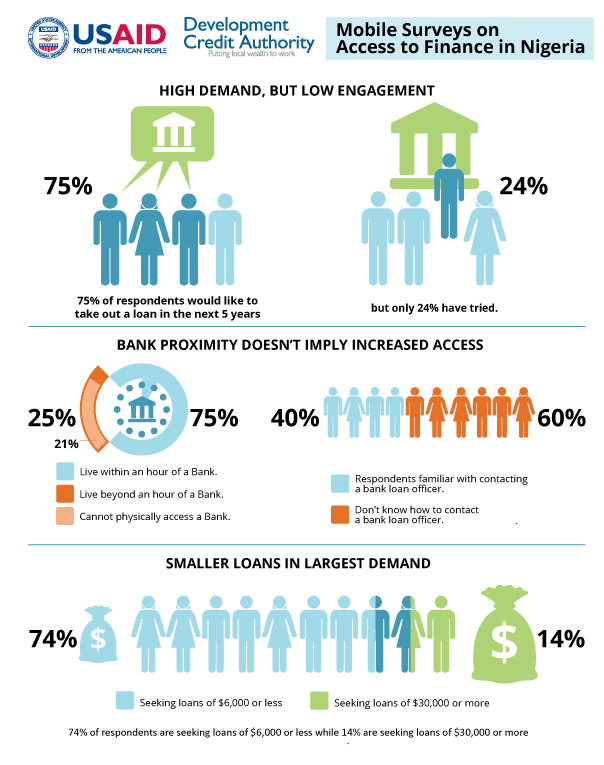Access to Finance for Nigerian Agriculture-related Businesses
A USAID Development Credit Authority (DCA) GeoPoll case study
Background
All around the world, businesses struggle to access the financing they need to expand. The US Agency for International Development’s Development Credit Authority (DCA) works to address this by providing partial credit guarantees to mobilize financing. With these additional resources, lenders can take on additional risk, and small businesses benefit from additional access to credit. To find out which countries and sectors are in the greatest need of financing, USAID DCA needs information from people and businesses around the world, who are often in regions where conducting surveys can be extremely slow and expensive.
Solution
By partnering with GeoPoll, USAID DCA is able to use mobile surveys to assist in developing new guarantees in sectors facing a data-demonstrated financing gap. This also enables DCA to regularly track the performance of current guarantees through direct monitoring surveys. In the first stage of an ongoing collaboration with GeoPoll, DCA wanted to explore a unique opportunity to expand guarantees in the agriculture and farming sector across 15 States in Nigeria as part of the Feed the Future Initiative.
Over two days in May 2014, DCA and GeoPoll administered more than 750 mobile phone surveys across 15 targeted states in Nigeria to ask agriculture- related businesses about access to finance and their knowledge of taking out loans.
Results
The Nigeria GeoPoll survey found that most respondents (3 in 4) would like to take out a loan in the next 5 years but only 1 in 4 have tried. Most respondents have been in business for 2 years or less and are seeking modest loans with 40% wanting 100,000 NGN (~$620 USD) or less. Most (60%) don’t know how to contact a bank loan officer but 75% are within an hour from a bank. Collateral requirements are the biggest barrier to acquiring a loan, mentioned by half of those who think they do not qualify to borrow money.
This demonstrates that there is a great need for small, targeted financing in the farming and agricultural sector, and while most respondents can access a bank, the banks themselves have a role to play in outreach and reducing the perception of high collateral requirements.
With this knowledge, USAID can more strategically and confidently invest in the agriculture sector responsible for feeding 170 million Nigerians, or nearly 20% of the population of sub-Saharan Africa. More results can be seen in the below infographic (click for full infographic).

Key Points
- USAID DCA provides partial loan guarantees to extend credit around the world, and needs information on which sectors to focus their support.
- A GeoPoll survey conducted in Nigeria over 2 days in May 2014 identified a large gap between those needing financing and those who have sought it out.
- USAID is now able to better target their loan guarantees in the agriculture sector in Nigeria.
Be Notified Of New Case Studies
